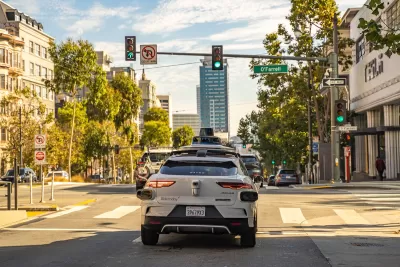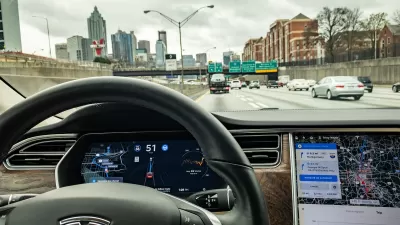The agency is losing almost half of the team that oversees autonomous vehicle safety, among dozens of other key personnel.

According to reporting by Ian Duncan in The Washington Post, recent firings at the National Highway Traffic Safety Administration (NHTSA) include “an engineer who worked with crash test dummies, employees who work with states on safety grant funding, and a research psychologist focused on drunken driving and speeding.”
“In all, the agency, the National Highway Traffic Safety Administration, will lose between 70 and 80 people, split roughly evenly between firings of probationary employees and buyouts, according to three people, who like others spoke on the condition of anonymity to avoid retribution.” The NHTSA employs roughly 800 people and is crucial to road safety efforts.
The firings include three out of the seven people tasked with overseeing autonomous vehicle safety. Whether or not the cuts were targeted, one former worker said they will amount to “less scrutiny of robotic vehicles.” According to one fired engineer, “The amount of people in the federal government who are able to understand this adequately is very small. Now it’s almost nonexistent.”
The NHTSA has several open investigations into autonomous vehicle technology, including Tesla’s self-driving features, Ford’s driver assistance technology, and autonomous taxi services Waymo and Zoox.
FULL STORY: DOGE employee cuts fall heavily on agency that regulates Musk’s Tesla

Alabama: Trump Terminates Settlements for Black Communities Harmed By Raw Sewage
Trump deemed the landmark civil rights agreement “illegal DEI and environmental justice policy.”

Planetizen Federal Action Tracker
A weekly monitor of how Trump’s orders and actions are impacting planners and planning in America.

The 120 Year Old Tiny Home Villages That Sheltered San Francisco’s Earthquake Refugees
More than a century ago, San Francisco mobilized to house thousands of residents displaced by the 1906 earthquake. Could their strategy offer a model for the present?

In Both Crashes and Crime, Public Transportation is Far Safer than Driving
Contrary to popular assumptions, public transportation has far lower crash and crime rates than automobile travel. For safer communities, improve and encourage transit travel.

Report: Zoning Reforms Should Complement Nashville’s Ambitious Transit Plan
Without reform, restrictive zoning codes will limit the impact of the city’s planned transit expansion and could exclude some of the residents who depend on transit the most.

Judge Orders Release of Frozen IRA, IIJA Funding
The decision is a victory for environmental groups who charged that freezing funds for critical infrastructure and disaster response programs caused “real and irreparable harm” to communities.
Urban Design for Planners 1: Software Tools
This six-course series explores essential urban design concepts using open source software and equips planners with the tools they need to participate fully in the urban design process.
Planning for Universal Design
Learn the tools for implementing Universal Design in planning regulations.
Clanton & Associates, Inc.
Jessamine County Fiscal Court
Institute for Housing and Urban Development Studies (IHS)
City of Grandview
Harvard GSD Executive Education
Toledo-Lucas County Plan Commissions
Salt Lake City
NYU Wagner Graduate School of Public Service





























